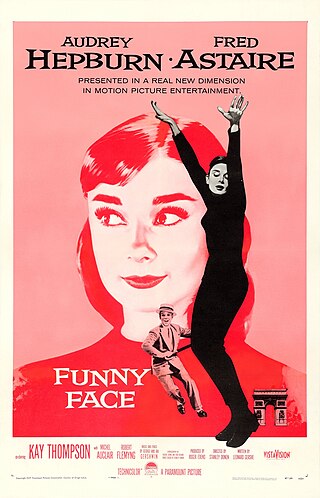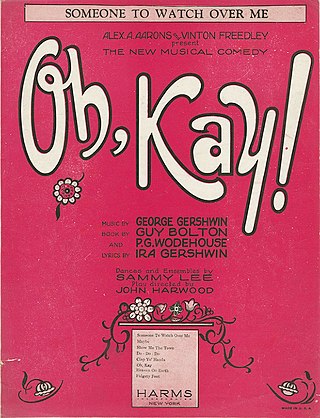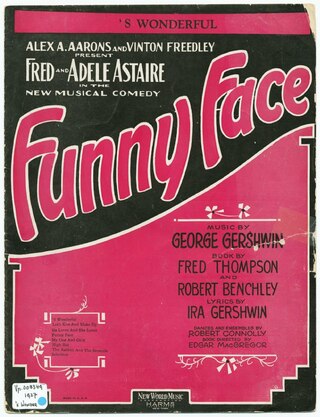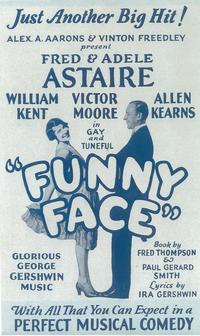
Adele Astaire Douglass was an American dancer, stage actress, and singer. After beginning work as a dancer and vaudeville performer at the age of nine, Astaire built a successful performance career with her younger brother, Fred Astaire.

Funny Face is a 1957 American musical romantic comedy film directed by Stanley Donen and written by Leonard Gershe, containing assorted songs by George and Ira Gershwin. Although having the same title as the 1927 Broadway musical Funny Face by the Gershwin brothers, and featuring the same male star, the plot is completely different and only four of the songs from the stage musical are included. Alongside Astaire, the film stars Audrey Hepburn and Kay Thompson.

Shall We Dance is a 1937 American musical comedy film directed by Mark Sandrich. It is the seventh of the ten Fred Astaire-Ginger Rogers films. The story follows an American ballet dancer (Astaire) who falls in love with a tap dancer (Rogers); the tabloid press concocts a story of their marriage, after which life imitates art. George Gershwin wrote the symphonic underscore and Ira Gershwin the lyrics, for their second Hollywood musical.
"Oh, Lady Be Good!" is a 1924 song by George and Ira Gershwin. It was introduced by Walter Catlett in the Broadway musical Lady, Be Good! written by Guy Bolton, Fred Thompson, and the Gershwin brothers and starring Fred and Adele Astaire. The song was also performed by the chorus in the film Lady Be Good (1941), although the film is unrelated to the musical.

"Someone to Watch Over Me" is a 1926 song composed by George Gershwin with lyrics by Ira Gershwin, assisted by Howard Dietz who penned the title. It was written for the musical Oh, Kay! (1926), with the part originally sung on Broadway by English actress Gertrude Lawrence while holding a rag doll in a sentimental solo scene. The musical ran for more than 200 performances in New York and then saw equivalent acclaim in London in 1927, all with the song as its centerpiece. Lawrence released the song as a medium-tempo single which rose to number 2 on the charts in 1927.
"Embraceable You" is a jazz standard song with music by George Gershwin and lyrics by Ira Gershwin. The song was written in 1928 for an unpublished operetta named East Is West. It was published in 1930 and included in that year's Broadway musical Girl Crazy, performed by Ginger Rogers in a song and dance routine choreographed by Fred Astaire.
"Let's Call the Whole Thing Off" is a song written by George Gershwin and Ira Gershwin for the 1937 film Shall We Dance, where it was introduced by Fred Astaire and Ginger Rogers as part of a celebrated dance duet on roller skates. The sheet music has the tempo marking of "Brightly". The song was ranked No. 34 on AFI's 100 Years...100 Songs.

"Fascinating Rhythm" is a popular song written by George Gershwin in 1924 with lyrics by Ira Gershwin.

"'S Wonderful" is a 1927 popular song composed by George Gershwin, with lyrics written by Ira Gershwin. It was introduced in the Broadway musical Funny Face (1927) by Adele Astaire and Allen Kearns.
"Slap That Bass" is a song composed by George Gershwin, with lyrics by Ira Gershwin, introduced by Fred Astaire and Dudley Dickerson in the 1937 film Shall We Dance.
"A Foggy Day" is a popular song composed by George Gershwin, with lyrics by Ira Gershwin. The song was introduced by Fred Astaire in the 1937 film A Damsel in Distress. It was originally titled "A Foggy Day " in reference to the pollution-induced pea soup fogs that were common in London during that period, and is often still referred to by the full title.
The commercial recording by Astaire for Brunswick was very popular in 1937.
"My One and Only" is a song composed by George Gershwin, with lyrics by Ira Gershwin, written for the 1927 musical Funny Face where it was introduced by Fred Astaire, Betty Compton and Gertrude McDonald. It was originally titled "(What Am I Gonna Do) If You Turn Me Down?"
"(I've Got) Beginner's Luck" is a song composed by George Gershwin, with lyrics by Ira Gershwin, written for the 1937 film Shall We Dance, it was introduced by Fred Astaire. It is a brief comic tap solo with cane where Astaire's rehearsing to a record of the number is cut short when the record gets stuck. Astaire's commercial recording for Brunswick was very popular in 1937.
"He Loves and She Loves" is a 1927 song composed by George Gershwin, with lyrics written by Ira Gershwin.

"'The Half of it, Dearie' Blues" is a song composed by George Gershwin, with lyrics by Ira Gershwin. It was introduced by Fred Astaire and Kathlene Martyn in the 1924 musical Lady be Good.

Funny Face is a 1927 musical composed by George Gershwin, with lyrics by Ira Gershwin, and book by Fred Thompson and Paul Gerard Smith. When it opened on Broadway on November 22, 1927, as the first show performed in the newly built Alvin Theatre, it starred Fred Astaire and his sister Adele Astaire. It was in this show that Astaire first danced in evening clothes and a top hat.
"Clap Yo' Hands" is a song composed by George Gershwin, with lyrics by Ira Gershwin.
"I Can't Be Bothered Now" is a song composed by George Gershwin, with lyrics by Ira Gershwin, written for the 1937 film A Damsel In Distress, where it was introduced by Fred Astaire.
"Strike Up the Band" is a 1927 song composed by George Gershwin, with lyrics by Ira Gershwin with the collaboration of Millie Raush. It was written for the 1927 musical Strike Up the Band, where it formed part of a satire on war and militaristic music. Although the musical was not successful, the instrumental version of the song, titled the "March from Strike Up the Band", has become quite well known. The song was also used in the Judy Garland-Mickey Rooney 1940 film Strike Up the Band.

Funny Face is the soundtrack to the 1957 film of the same name, with music by George Gershwin, from his Broadway musical Funny Face (1927), and new songs composed by the film's producer Roger Edens,.








